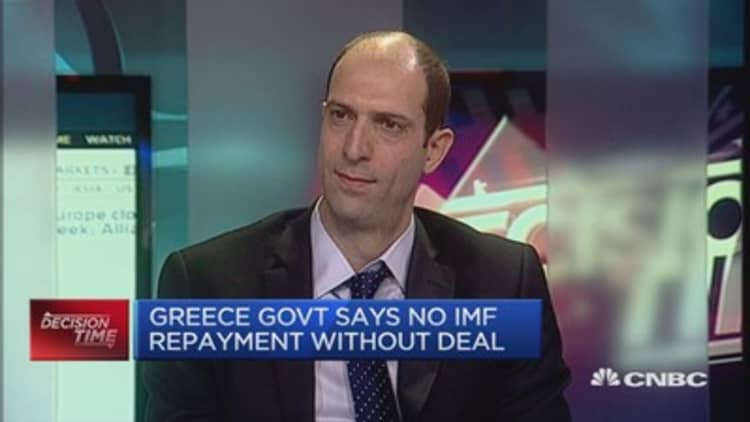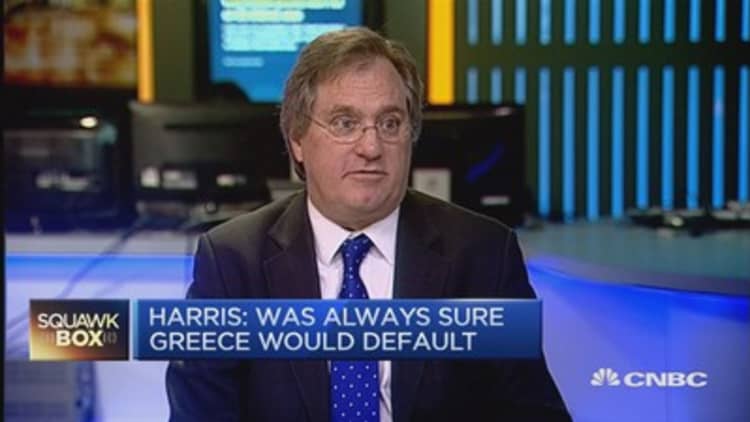
Greek stocks rose on Wednesday after reports of a compromise plan from its international creditors -- although Greece insisted it had not formally received any new proposals.
The European Commission, European Central Bank (ECB) and International Monetary Fund (IMF) on Tuesday drafted the broad lines of an agreement to put to the Greek government, according to Reuters, in a bid to resolve months of tense negotiations over Greek reforms and debt.
On Wednesday, the Financial Times reported details of the proposals, including the requirement for Greece to post a primary budget surplus of 1 percent of gross domestic product (GDP) this year. This would be expected to rise to 3.5 percent in 2018 and is significantly below the target of 3 percent included in the country's existing EU/IMF bailout.
Greek stocks were trading higher by around 4 percent in afternoon trading with traders attributing the rise to speculation a reforms-for-rescue deal was near.
French economy minister Emmanuel Macron told CNBC in Paris Wednesday that Europe's leaders were committed to "find a solution to keep Greece in the euro zone," but this required an equal commitment from the Greek government.
"Mr Tsipras is completely aware of his chance and will have basically to take his responsibilities and propose some measures to meet his commitments," Macron added.
However, Greek government sources told CNBC that -- despite the FT report -- Athens had not received any official notification of the new proposals.
"We haven't seen the proposals. They haven't been formally tabled," an official, who did not want to be named due to the sensitive nature of the ongoing discussions, told CNBC.
"We're going to use this evening's meeting as a basis to discuss our own proposals, which are full and concrete plans and include a final review of our existing bailout program," the official told CNBC.
"We have very good ideas about a growth plan and have a set of proposals that will take any thoughts of a 'Grexit' (a Greek exit from the euro zone) off the table."
Before Prime Minister Alexis Tsipras left for Brussels Wednesday to meet with the European Commission's President, Jean-Claude Juncker, to discuss Greece's deal. he issued a defiant statement calling for unity.
"Today more than ever, it is necessary for the institutions–and especially for the political leadership of Europe–to accede to the realism that the Greek government has been adhering to for the last three months while negotiating the fair requests of the Greek people for the benefit of a united Europe, and indeed, for the people of Europe," the statement read.
"We need unity, we must avoid division."
Read MoreGreek crisis: 2,400 hours of brinkmanship
Any offer of a deal from creditors puts the ball firmly in Greece's court, although the consequences of it rejecting an agreement could be dire.
Athens faces a 300 million euro ($327.9 million) payment to the IMF on Friday, but there are doubts that the country can honor the debt without further financial aid.
In something of a pre-emptive strike, Greece submitted its own reform proposals to its European counterparts earlier this week, but they were deemed – not for the first time – "insufficient."
Michael Hewson, chief market analyst at CMC Markets, said Wednesday that given the tense negotiations between Greece and its lenders over the last four months, a quick agreement was unlikely.
"Certainly expectations of a deal by Friday still seem some way off, particularly given the demeanour of Eurogroup (of euro zone finance ministers) leader Jeroen Dijsselbloem who appeared rather detached about the prospect of a quick solution," Hewson said in a note.
Read MoreGreek talks 'progressing'…so where's the deal?
"The key focus today will be whether Athens accepts the newly agreed deal outline, having submitted plans of its own earlier this week, with lower budget surplus targets, which it wants to be the basis of any new agreement."
Tsipras stuck?
It's a tough decision for Tsipras, who could be both damned if he accepts a deal tabled by lenders, and damned if he doesn't. His Syriza party was elected for its anti-austerity pledges, but Greece faces economic ruin without further aid; the government's funds are running low and Friday's IMF payment is just one of many debts due to lenders this summer.

However, Craig Erlam, senior market analyst at foreign exchange company OANDA, said that Greece was likely to reject its creditor's proposals.
"Tsipras is due to meet with European Commission President Juncker this evening but I fail to see what can be achieved from this if both sides don't come baring concessions, and pretty significant ones from Greece's perspective," he noted on Wednesday.
More drastic action could be needed to spur the Greek government into action, Erlam added, such a Greek government vote or referendum on the issue, which would effectively free Syriza from its pre-election promises.
"Unfortunately, this only seems likely once the country is backed into a corner, either when it is about to default on its debt or when the ECB forces larger haircuts on Greek debt as part of the emergency liquidty assistance (ELA) program or even worse, cuts Greece off altogether and deems it insolvent," he said. "This would be a drastic and undesirable scenario for all concerned."
- By CNBC's Holly Ellyatt, follow her on Twitter @HollyEllyatt. Follow us on Twitter: @CNBCWorld



